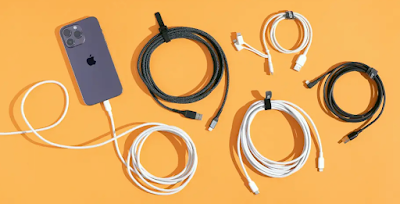What Is an iPhone Cable: Everything You Need to Know
Table of Contents
- Introduction
- Understanding iPhone Cables
- 2.1 The Evolution of iPhone Cables
- 2.2 Types of iPhone Cables
- The Importance of Genuine iPhone Cables
- Identifying Counterfeit iPhone Cables
- The Impact of Using Non-Apple Certified Cables
- 5.1 Compatibility and Performance Issues
- 5.2 Safety Concerns
- 5.3 Warranty Void
- How to Care for Your iPhone Cable
- 6.1 Avoiding Physical Damage
- 6.2 Proper Storage
- 6.3 Regular Maintenance
- Upgrading to the Latest iPhone Cable Technology
- 7.1 Advancements in Lightning Cables
- 7.2 The Introduction of USB-C Cables
- The Best iPhone Cables on the Market
- 8.1 Apple Original Lightning Cable
- 8.2 Anker Powerline II
- 8.3 Belkin Boost Charge
- 8.4 Aukey Right-Angled Cable
- DIY iPhone Cable Repairs
- 9.1 Troubleshooting Common Issues
- 9.2 Replacing Connectors
- 9.3 Fixing Frayed Cables
- Environmental Impact and Recycling
- 10.1 E-Waste Concerns
- 10.2 Sustainable Practices
- Conclusion
Introduction
One of the most popular and iconic smartphones is the iPhone, known for its sleek design, advanced features, and user-friendly interface. To power and connect these devices, Apple provides a wide range of cables, including the iPhone cable. In this article, we will explore everything you need to know about iPhone cables, their types, importance, care, and much more.
Understanding iPhone Cables
2.1 The Evolution of iPhone Cables
The journey of iPhone cables began with the first-generation iPhone, where Apple introduced the 30-pin connector. Over the years, the technology evolved, and Apple replaced the 30-pin connector with the Lightning connector, making the cables slimmer and reversible.
2.2 Types of iPhone Cables
There are different types of iPhone cables available in the market, including Lightning to USB-A cables, Lightning to USB-C cables, and USB-C to USB-C cables. Each serves specific purposes and offers varying charging speeds and compatibility.
The Importance of Genuine iPhone Cables
Using genuine iPhone cables is crucial to ensure the optimal performance of your device. Genuine cables are specifically designed for Apple products, and they undergo rigorous testing to meet quality standards.
Identifying Counterfeit iPhone Cables
Counterfeit iPhone cables flood the market, often resembling genuine ones. We will discuss how to identify these counterfeit cables and why you should avoid them.
The Impact of Using Non-Apple Certified Cables
5.1 Compatibility and Performance Issues
Non-certified cables might not be compatible with your iPhone, leading to charging and syncing problems. We'll explore the potential issues and their consequences.
5.2 Safety Concerns
Using uncertified cables can pose safety hazards, increasing the risk of electrical accidents and damage to your device.
5.3 Warranty Void
Apple's warranty may become void if your iPhone is damaged due to the use of non-certified cables. We'll discuss how this can impact your device's repair and replacement options.
How to Care for Your iPhone Cable
Proper care can extend the lifespan of your iPhone cable and prevent potential issues.
6.1 Avoiding Physical Damage
We'll provide tips on protecting your cable from physical damage, such as bending, pulling, and exposure to liquids.
6.2 Proper Storage
Effective storage methods can prevent cable tangling and minimize wear and tear.
6.3 Regular Maintenance
Simple maintenance practices can keep your cable in excellent condition and ensure reliable performance.
Upgrading to the Latest iPhone Cable Technology
As technology advances, Apple introduces new and improved iPhone cables.
7.1 Advancements in Lightning Cables
We'll explore the latest developments in Lightning cables and how they offer enhanced functionality.
7.2 The Introduction of USB-C Cables
Apple's shift to USB-C cables opens up new possibilities for faster charging and data transfer.
The Best iPhone Cables on the Market
Discover some of the top-performing iPhone cables available today.
8.1 Apple Original Lightning Cable
The classic Apple Lightning cable remains a popular choice for many users.
8.2 Anker Powerline II
Known for its durability and high charging speeds, the Anker Powerline II is a reliable alternative.
8.3 Belkin Boost Charge
Belkin Boost Charge cables offer fast charging and a range of lengths for added convenience.
8.4 Aukey Right-Angled Cable
The Aukey Right-Angled Cable design prevents cable stress and offers seamless use during charging and gaming.
DIY iPhone Cable Repairs
Learn how to troubleshoot and fix common issues with your iPhone cable.
9.1 Troubleshooting Common Issues
We'll address common problems like slow charging and connection failures and suggest troubleshooting steps.
9.2 Replacing Connectors
If your cable's connectors are damaged, you can attempt to replace them with the right tools and guidance.
9.3 Fixing Frayed Cables
Discover methods to repair frayed cables, making them functional again.
Environmental Impact and Recycling
Explore the environmental impact of electronic waste and how you can contribute to sustainable practices.
10.1 E-Waste Concerns
Understand the environmental challenges posed by improper disposal of electronic devices and cables.
10.2 Sustainable Practices
Learn about eco-friendly cable options and responsible recycling methods.
Conclusion
In conclusion, iPhone cables are essential accessories for maintaining the functionality of your Apple device. Using genuine and certified cables ensures optimal performance, safety, and longevity. By taking good care of your iPhone cable and staying informed about the latest advancements, you can enhance your overall iPhone experience.
Get Access Now: https://bit.ly/J_Umma
FAQs
Can I use any cable with my iPhone? It is recommended to use genuine Apple-certified cables to avoid compatibility and safety issues.
What is the main advantage of USB-C cables? USB-C cables offer faster charging and data transfer speeds compared to traditional cables.
Are third-party cables safe to use? Some third-party cables can be safe, but it's best to opt for certified options from reputable brands.
How often should I replace my iPhone cable? Regularly inspect your cable for wear and tear, and replace it if you notice any damage.
Can I repair a frayed iPhone cable on my own? Repairing a frayed cable can be attempted if you have the right tools and follow proper instructions.







.png)
